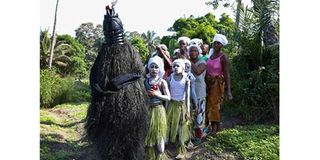Sierra Leone: 130 rights groups demand FGM ban

Secret Bondo society members are led by the Black Devil as they begin their procession across the field of Songo village to perform on December 2, 2018. For youngsters in Sierra Leone, the end of a year in class can entail secretive tribal initiation rites. The country has been told to ban FGM.
What you need to know:
- At 83 per cent FGM prevalence, the country has one of the highest numbers of the 15-49 year-old girls and women who have either been cut or are at risk of being cut.
- The activists say women and girls continue to die from FGM-related complications due to the country’s inaction.
A coalition of 130 women's rights organisations has petitioned the Sierra Leone government to criminalise female genital mutilation (FGM).
The organisations, drawn from across the world, want the Sierra Leone government to urgently enact a law to prohibit the harmful cultural practice and ensure the victims access justice.
At 83 per cent FGM prevalence, the country has one of the highest numbers of the 15-49 year-old girls and women who have either been cut or are at risk of being cut. Yet the country lacks explicit prohibitive laws.
Rights violation
“A law explicitly banning FGM in Sierra Leone would make it clear to its citizens that FGM is a human rights violation and a form of gender-based violence,” they said in their February 1 petition.
“It would define the government’s obligations in providing protection to women and girls, demonstrate political will and intent, and communicate that the State is ready to take action.”
The activists say women and girls continue to die from FGM-related complications due to the country’s inaction. The most recent case being the death of a 21-year-old woman in Nyandeni village, Bonthe district, on December 20, 2021. She is said to have died from acute bleeding after the cut.
“Despite the harm caused by FGM, the government of Sierra Leone has failed to criminalise this harmful practice,” they decried.
“The country’s penal code does not specifically prohibit FGM, and there have been no known prosecutions relating to FGM.”
No political goodwill
They said lack of political goodwill has even complicated the urgent need to save girls and women from the inhumane practice.
“We strongly condemn the actions of politicians who are supporting FGM. We commend the politicians and other duty bearers who have spoken out and taken action against this harmful practice, and we call on others to join them,” they said.
By failing to “explicitly condemn FGM,” the State is encouraging the cut, they argued.
“Gender discrimination in Sierra Leone means existing laws meant to uphold the rights of women and girls are not being effectively implemented to protect against FGM or punish perpetrators,” they said.





